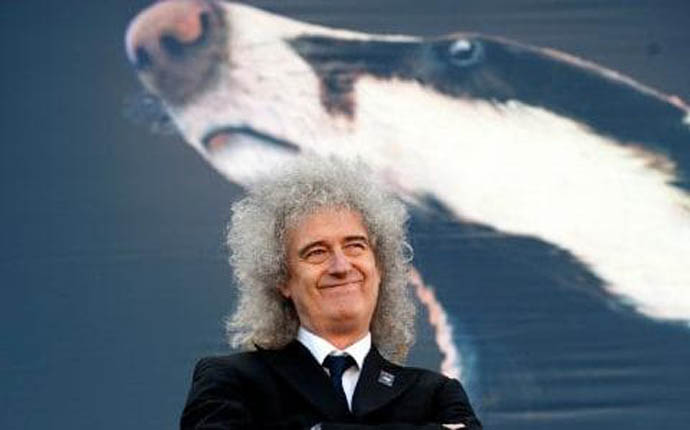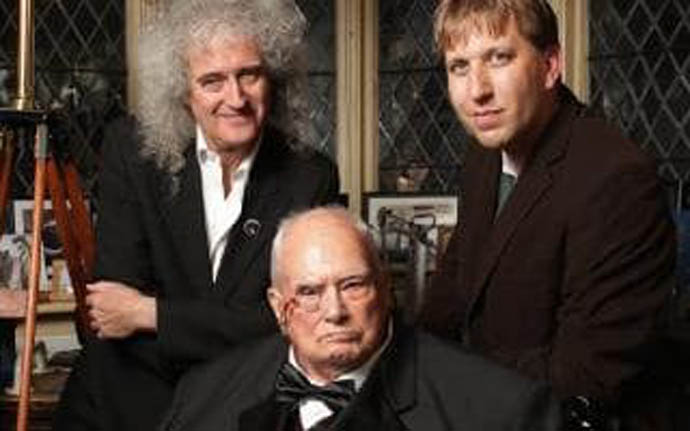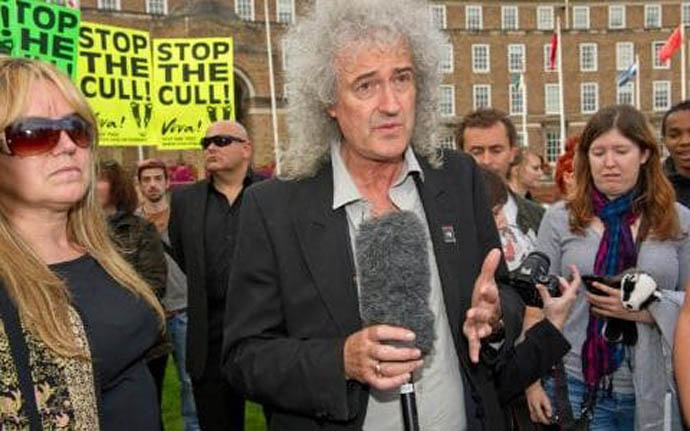TELEGRAPH
19 July 2017 by Adam Whit
From badgers to flamboyant alter egos: a guide to the strange obsessions of Queen’s Brian May

Brian May being dwarfed by one of his good friends: a badger Credit: © Eddie Mulhollan
Brian May has long said that he would rather not be remembered as the flamboyantly-haired guitarist for Queen, but rather as a saviour of the badgers, a one-man army against the bureaucratic murderers responsible for the culling of thousands of furry black-and-white omnivores every year. It’s not quite reincarnated ghosts of the Alamo, but badgers dominate May’s mind, an obsession that renders moments on stage or relaxing in his presumably very large house with Ang off EastEnders seem comparably dull.
“It’s threatening my life, it’s utterly consuming my life,” he told The Guardian in 2012. “It makes it difficult to continue a proper family life, it makes it difficult to continue music, to continue astronomy, to continue my stereoscopic adventures.”
Speaking of astronomy and stereoscopes, badgers aren’t strictly alone in May’s strange life-consuming obsessions. He in fact has an array of surprise hobbies, one of which may or may not involve assuming the role of a time-travelling alter ego. But, honestly, how else is a legendary multi-millionaire going to fill his days? As he turns 70, here are some of May’s less famous interests… He is basically Sir Patrick Moore.

May alongside Sir Patrick Moore and astrophysicist Chris Lintott in 2012 Credit: Rii Schroer
Brian May, or Dr. Brian May as he is officially titled, isn’t just a rock legend, but also a published astronomer, with a keen interest in space. In fact, May’s extracurricular hobby stems from before he was ever a musician, having been fascinated by the universe as a result of obsessively watching Patrick Moore’s The Sky at Night as a youngster. May was so into his hobby that he ended up studying for a PhD in Astronomy at Imperial College London, after completing a graduate degree in physics and mathematics. Unfortunately, success with some rock band ended up forcing him to drop out of his PhD studies and travel the world instead. But all was not lost: on encouragement from Patrick Moore, later one of his close friends, May returned to Imperial to finish his PhD in 2007, writing a thesis titled A Survey of Radial Velocities in the Zodiacal Dust Cloud.
Space | Brian May | Oxford Union – https://youtu.be/6nISwx3VbRA
Subsequently, he has authored two books, including one written in collaboration with Patrick Moore, worked with NASA, launched an asteroid awareness campaign, and had an asteroid named after him (the 52665 Brianmay).
But it was his relationship with Moore that became one of May’s greatest personal victories, May referring to him in the press as something of a father figure. Shortly before Moore’s death in 2015, May purchased the financially-barren astronomer’s home and allowed him to live in it on a nominal rent, later hoping to turn the house into a museum or study centre for amateur astronomers, who would get use out of the home’s significant library and tech equipment. Alas, the plans did not come to fruition, and May was forced to sell up, donating all funds to the South Downs Planetarium — one of Moore’s favourite projects.
He is a friend of the humble badger.

Speaking at a Stop the Cull rally in Bristol in 2011 Credit: Christopher Jones
May claims to have always had a passion for animals, but it was astronomy that specifically drove him to animal welfare campaigning. “An astronomer only has to look out into the universe to realise we are just a small planet circling a very ordinary star,” he told The Ecologist, before explaining how that sense of galactical arrogance inspired him to look after our most vulnerable creatures.
It wasn’t always badgers, however. May’s first animal rescue quest involved hedgehogs, specifically an attempt in the Scottish Uist islands to cull hundreds of the cute critters after they were found to be eating the eggs of ground-nesting birds.
“The Scottish RSPCA was one of the organisations in favour of the killing! Can you believe that?” he told The Ecologist. “We persuaded them to relocate the hedgehogs to the mainland. After all, hedgehogs are in trouble here – there are fewer and fewer of them and we need them. And when we achieved that relocation, the feeling – the realisation that I could help make a difference – that was wonderful! But it also made me see how easy it is for people to see killing inconvenient wildlife as the answer to a problem, when the animals themselves have no voice.”